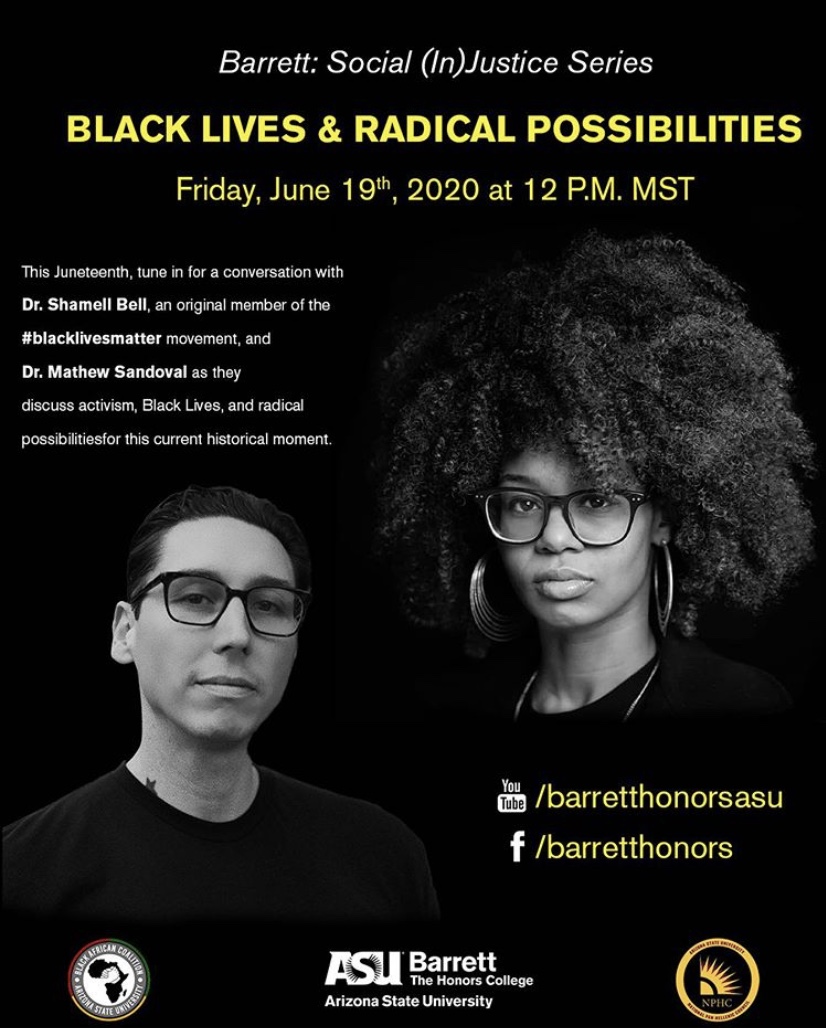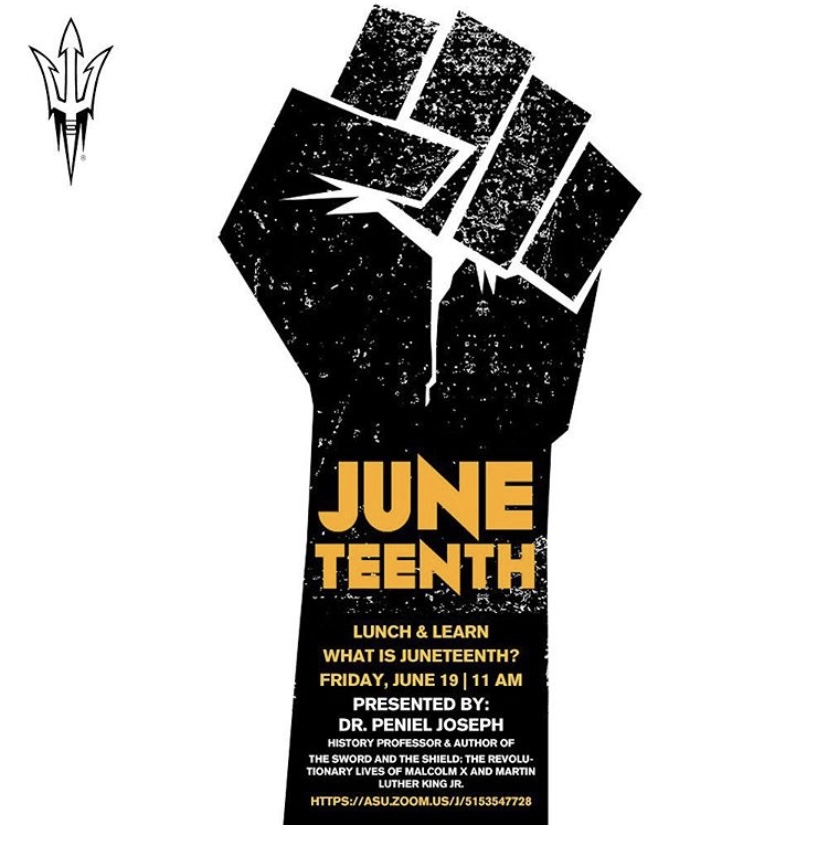How Sun Devils can celebrate Juneteenth this year
June 19 is a holiday that many students can go through four years of college never knowing about, said ASU Honors Faculty Fellow Matthew Sandoval. Although he’s a race scholar, even Sandoval said he only found out about the Juneteenth holiday during graduate school and had to seek the knowledge out.
Juneteenth commemorates the end of “de facto” slavery in the United States, said Sandoval. Even after the Emancipation Proclamation, abolition wasn’t enforced uniformly until June 19, 1865, two and half years after President Abraham Lincoln’s Emancipation Proclamation — which had become official Jan. 1, 1863.
Sandoval said that celebrating the event is more poignant than ever this year because of the critical conversations happening right now about police brutality and racial justice.
“It’s the celebration of the legit end of slavery. Not just the Proclamation but literally the end of slavery in Texas and the end of slavery in the United States,” said Sandoval. “It’s important for us to say OK that was then, where are we at now? What are the steps that have taken place in between then for us to acknowledge that where we’re at right now may not be true liberation for black people and true freedom for black people?”
Sandoval is co-hosting a discussion about black lives and racial possibilities to commemorate Juneteenth featuring Dartmouth University Professor Shamell Bell, a founder of the Black Lives Matter movement.
The students of ASU’s Black African Coalition are cosponsoring this and another virtual Juneteenth celebration in which Sun Devils can participate from their home communities locally and around the country. The two events will give students the opportunity to learn, connect and voice questions through virtual conversation.
Divine Lee, rising computer systems engineering junior and community liaison for Arizona State University’s Black African Coalition, said the events are a great way to learn and start conversations regardless of where Sun Devils are.
“We felt like this was the best way virtually for just open dialogue, for students to just ask their questions or get their questions answered with a Q&A. To allow them to understand, learn something and hopefully take something away from one or two of the events if they decide to go to both.”
Ahead of the events, Lee and Sandoval shared why students should celebrate and learn about the end of slavery and ask critical questions about current events on Juneteenth and beyond. The events are on June 19 at 11 a.m. and noon.
Question: How can the ASU community celebrate Juneteenth this year?
Lee: We are celebrating in collaboration with two different programs that we are actually having. One is in connection with [Dr. Sandoval], who works for Barrett. It’s just basically a Q&A that will be live streamed from YouTube and Facebook. [And there will be] another Q&A with virtual settings, where students can come and ask questions. It’s really just an open dialogue for students to hear, learn and understand the meaning behind Juneteenth.
Q: What inspired these particular virtual discussions?
Lee: Actually we feel like the way we are celebrating, I feel like, was our last resort. We did want to get involved way more. But since there is a lot going on with COVID we’re only mostly able to do a lot of stuff virtually. The Black African Coalition really prides itself on having events that will be meaningful to the community. Not just the black community but for all communities for them to learn, understand and just educate themselves.
So we felt like this was the best way virtually for just open dialogue, for students to just ask their questions or get their questions answered with Q&A. To allow them to understand, learn something and hopefully take something away from one or two of the events if they decide to go to both.
Sandoval: All of this is context-specific. I’m a professor at Barrett. When we were talking immediately about how do we start to address what’s happening in the world right now in our own university and in our own college, especially after reading President Michael Crow’s statement that he put out on June 1, where he kind of put everybody at ASU on notice that hey, we have to come up with solutions here quick. To me it was important as a college for us to take a step forward and say OK what can we program for our students right now both for students within Barrett and at ASU more generally to draw attention to how we might be able to come up with some solutions for dealing with white supremacy, because that’s what we are dealing with.
Q: How can Sun Devils celebrate Juneteenth nationwide?
Lee: Well participation just differs in community, whether it is within their own community where they live locally, if they are having an event just supporting [it].
Ask questions, email us, see if they have any questions that they would really want answered. As well as to just show support, they don’t have to just show support to the Black African Coalition they can just show support to their community in Arizona or surrounding cities. Whether they are still at home or whether they are in Arizona, I know that all over the country they are celebrating Juneteenth.
For example I will be attending an event in Atlanta which is like a big block party celebration with free food, free games and basically free everything just to get the community involved.
Sandoval: To me Juneteenth of course is the celebration of the end of de facto slavery. But we also have to be very careful when we talk about the end of slavery. ... Slavery after the Civil War transformed into a lot of different things. Which is to say the rise of the prison industrial complex: a different way to capture black bodies, hold black bodies and force them to do labor. One might be able to say that what we’re looking at in prisons is a form of slavery. Although slavery has ended, slavery has also transformed. So what Juneteenth means to me is an opening for a critical conversation for us to think critically about where we’re at now versus where we were at 130 years ago, 140 years ago.
Q: How do you think these events impact Sun Devils?
Lee: I feel like the most important take away is to understand, what is Juneteenth? To get that historical background, to see why it is so important among the black community and then to see just their support as well, educating themselves and allowing them to see a different perspective. Because not all people understand what Juneteenth is about, the importance to some people. I know that Juneteenth may seem like an important holiday to some but not all.
And just if they get that understanding, that is my biggest take away that I hope a Sun Devil could receive, as well as to just get involved with their student body. Meet new people, see who attends Arizona State University, see what kind of students they go to school with, start a conversation.
Basically, keep people open-minded to start the conversations that need to be had and create a new source and newfound friendship amongst the ASU student body or just ASU period with the faculty, staff and students.
Sandoval: I’d love for students to come away with historical knowledge and I’d also love for them to come away with some sense of where we might be able to move in the future. … This is a crisis moment for American politics and American society. That is a beautiful place to be in sometimes because it forces you to really radically reimagine what can be possible. Because we are in a crisis we have to imagine how do we get ourselves out of this crisis? This crisis of white supremacy and black death every couple of weeks on social media and in the media from police.
[I hope students will come away] with an understanding of what this means historically and what this is going to mean for them as they move into the generation that is going to be forced to deal with this head-on. Every generation faces this in some sense. My generation certainly did when I was coming up. We took it as far as we could and now college-age students are really having to put their hands in the soil to say we are going to take this on as our issue and we are going to be dedicated to solving it. In the same way students did in the 90s, in the same way students did in the Civil Rights Era in the 60s, in the same way that people did in Reconstruction back in the 1920s and 30s. This is this generation of students’ opportunity to get their hands into the soil and help make real social change.
Q: Where can Sun Devils find more information on the celebrations and the Black African Coalition?
Lee: They can actually follow Black African Coalition on Instagram. As well as during our events we have signup sheets where people can get added to our newsletter subscription. Each week, I’m in charge of that. I send out a newsletter to students who are subscribed and basically give them a rundown for information that week. Whether it’s events, basic information we think students should know or internships, any scholarship opportunities, just informing students as much as possible to better them, educate them, inform them and give them more exposure.
Q: How does Juneteenth inspire you to think about history and about change?
Lee: We are in an important time in our lives right now; we are young. I feel like this is a time in our lives where we need to stick together. We might not all agree with each other's point of views but as long as we listen, understand and try to comprehend how each other feels, where we show respect to each other I feel like that would be the greatest take away from college because we are the changemakers. We are the ones who basically pave the future. And as long as we show that we support one another, respect one another, then we are basically creating a new great foundation for our own road and for people after us to be proud of.
Sandoval: [Juneteenth] is a critical moment; it’s not just a celebratory moment it’s a real critical moment for us to check in with where are we at in 2020 with regards to the opportunities and promises for justice, liberty and freedom for all citizens and how we’ve fallen short.
